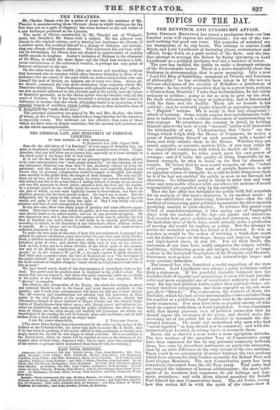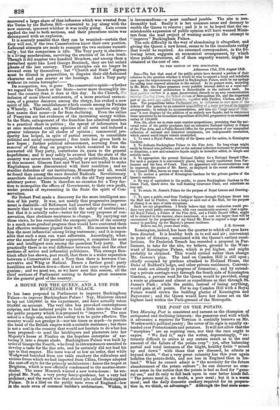TOPICS OF THE DAY.
THE BENTINCK AND LYNDHURST AFFAIR.
LORD GEORGE BENTINCK has raised a prodigious dust—no less familiar term will express his achievement ; yet out of the tur- moil nothing but good can come. Hia purposes of mischief are too transparent to do any harm. The attempt to convict Lord Ripon and Lord Lyndhurst of, bartering places, ecclesiastical and official, broke down on a mere recital of the facts ; and the far- ther attempt to revenge the failure by fixing ignominy on Lord Lyndhurst as a political intriguer was but a renewal of defeat. The case has enabled the public to make a thorough estimate of the Protectionist leader. There is a naive simplicity about the freshman in statesmanship, that is quite engaging. Like a new "Lord Gil Bias of Saritillane, ornament of Oviedo, and flambeau of. philosophy," he has evidently been taken in by the not too fulsome adulations.of his cavalier of Peiiaflor—a gentleman of
the press : he has really conceived that he is a great man, perhaps a._Heaven-born Minister Under that hallucination, he has taken
seriously to politics ; going so far as even to give up his stud. He finds statesmanship as easy as jockeyship, and is intoxicated with the fame and the facility. There are no bounds to his activity ; and he evidently piques himself on appealing especially to " English " notions. He is ready to face any antagonist— afraid of nothing. Some might suspect that indiscriminate bold- ness to indicate as much a certain obtuseness of understanding as
true courage. He propitiates the country, in detail; by holding himself open to the uses of each " interest,' and he will undertake
the tribuneship of any. Understanding that "facts" are the things which weigh with the House of Commons, he makes a point of furnishing himself on each occasion with a bushel of facts, and duly uncarts them in the House. Whether they are
sound, apposite, or accurate, matters little, if you may judge by the unqualified confidence with which he shovels all forth. As
a source of strength, he relies much upon his own power of revenge ; and if it lacks the quality of being formidable by in- herent strength, he tries to make up for that by absence of scruple. He boasts that he uses coarse weapons, on the " videri vult pauper" principle. The want of scruple, however, is only an apparent source of strength: he would be more 'dangerous than
he is if he had not enabled the public so soon to see through his character. No influential party is likely to enter into any very close and responsible alliance with one whose lax notions of moral responsibility are equalled only by his credulity. That the late affair has furnished the public with full materials for an analysis of this man's character, is its smallest result : it
has also established one interesting historical fact—that the old method of compassing great political manoeuvres by old-womanish gossiping scandal is quite obsolete. To witness this grand coup d'etat of scandalmongering, is like seeing one of Vanbrugh's plays with the costume of the day—all quaint and ridiculous. You wonder how grave politicians and real statesmen, even with the half-shut eyes of those days, could actually make a profession
of moving the world by enbolnes so paltry. But the attempt to revive the wretched system has failed as it deserved. It was as
hopeless as would be the notion of reviving a brick-dust court
suit for Julius Ccesar on the stage—hoops and toupees' bag-wigs and high-heeled shoes, in real life. For all their faults, the
statesmen of our time have really outgrown the vulgar, servile, backbiting, talebearing gossip and intrigue that occupy so large a share in the historical biographies of the Walpoles and Harrises. Statesmen now-a-days must use and acknowledge larger and more genuine influences. The turmoil has also furnished a useful exposition of the state of parties. Lord Lyndhurst was always a party politician rather than a statesman. If his youthful curiosity ventured into the doubtful field of inquiry and speculation, he soon fell back into the safer and more congenial one of constituted authority and advo- cacy. He has had political habits rather than political views : ad- vocacy involved antagonism, and those engaged on his side were ipso facto " friends." The earnestness, the warmth of heart,. the liberality, which his lack of real statesmanlike views excluded from his conduct as a politician, found ample vent in the intercourse of party connexion. Few men have been so popular among all who came in contact with them as Lord Lyndhurst. It was consistent
with that hearty personal view of political connexion that he should regret the severance of his party, and should make the
crowning act of his public life an attempt to reconcile the dis- severed sections. He could not understand why men who had " acted together" so long should now be separated; and with dis- interested zeal he tried, in taking leave, to reconcile them. Never did so shrewd a man make a more egregious mistake. The two sections of the quondam Tory or Conservative party have been separated far less by any personal animosity between them, less even by discordant sentiments on particular measures, than by an utter difference in the very nature of the two sections. There could be no community of nature between the two sections which have chosen for their leaders severally Sir Robert Peel and Lord George Bentinck. The new Conservative party has been completely eliminated from the old Tory party. That party had
not escaped the influence of human advancement ; the most intel- ligent of its members had outgrown its old feelings and dog- matic prejudices ; and with those altered members Sir Robert Peel formed his new Conservative band. The old Tories, seeing how this notion fell in with the spirit of the times—how it
recovered a large share of that influence which was wrested from the Tories by the Reform Bill—consented to jog along with the ' new caravan ignorant whither it was really going. Late events applied the test to both sections, and their precarious union was decomposed with an explosion.
It is scarcely possible that they can be reunited—certain that they will not, if the true Conservatives know their own position. Laboured attempts are made to compare the two sections numeri- cally ; but the comparison is idle. The Tory party is obsolete— is a living anachronism, surviving the erection of its Swn tomb. Though it did number ewo hundred Members, and among them a perturbed spirit like Lord George Bentinck, they are but unlaid ghosts of the last century. Their principles can no longer be avowed even by themselves; but "Church and State" dogmas must be diluted in generalities, to disguise their old-fashioned character and pass muster at the hustings. And a Tory party without its rotten boroughs!— Its occupation, too, is gone. The conservative spirit—whether we regard the Church or the State—never more thoroughly im- bued the country than it does at this day. In the Church, the infusion of more liberal sentiments, of a more practical earnest- ness, of a greater decorum among the clergy, has evoked a new spirit of life. The establishment which counts among its Prelates a Whately, a Thirlwall, and a Wilberforce—to mention only the first names that occur—is far from declining. Even the sallies of Puseyism are but evidences of the increasing energy within. In the State, enlargement of the franchise has admitted numbers to a practical share in politics the spread of information has at once moderated extreme opinions of all sorts and induced a greater tolerance for all shades of opinion ; commercial pro- sperity has helped, in spite of partial reverses, to consolidate political and social contentment ; free trade has given birth to new hopes ; further political advancement, accruing. from the removal of that drag on progress which consisted in the un- converted old Tory party, contributes its quota to the general hopefulness; and it may safely be averred that the state of the country was never more tranquil, socially or politically, than it is at this moment. Glances East and West have not tended to make Englishmen more discontented with their condition ; and no sturdier defenders of our institutions, Monarchy and all, would be found than among the once dreaded Radicals. Revolutionary anarchists died out simultaneously with the old Tory asserters of arbitrary power. There is therefore no occasion for a Tory fac- tion to monopolize the offices of Government, to their ownprofit, under pretext of representing in the State the spirit of Con- servatism.
Sir Robert Peel made a discovery for the more intelligent sec- tion of his party. It was, not merely that progressive improve- ment is desirable—all Reformers had asserted that doctrine ; not merely that it may be reconciled with the safety of institutions ; but that it is actually safer—better for the very purposes of con- servation, than obstinate resistance to change. By carrying out those views, he has reconciled the energetic spirits of the country to a much more gradual progress than would have contented them had effective resistance piqued their will. His success has made him the most influential among living statesmen ; and it is impos- sible that such a man can want adherents. Accordingly, what- ever the number of his peculiar supporters, it comprises the most able and intelligent men among the quondam Tory party. But practically there is no real difference between them and the other sections of active and influential politicians. This strange Ben- thick affair has shown, past recall, that there is a wider separation between a Conservative and a Tory than there is between Con- servative and Whig or Radical. Hence a further good : party hostilities are broken down—there is not the same scope for anta- gonism ; and we must see, as we have seen this session, all the chief sections of Parliament uniting to further great measures for the general good of the country.



























 Previous page
Previous page